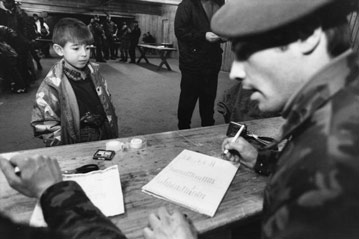Lesson plans for ages 9-11 in History: Refugees in History
Lesson plans for ages 9-11 in History: Refugees in History
-

LESSON 5: Asylum
Purpose
In this lesson, the class will apply to the contemporary world, the concepts they have learnt through historical examples.
Preparation
Install a large map of the world where all the children can clearly see it. Also have ready a dictionary.
Introduction
Ask the students to talk about the newspaper articles they have collected, e.g. the article is about which country? What type of conflict is happening? Who is fighting in the conflict? What is happening to the people who are not involved in the fighting? Has the fighting caused people to flee their country?
Using the world map and the information provided in The State of theWorld's Refugees 1995: In Search of Solutions p. 12-13, show the children the location of some of the armed conflicts, the refugee flow, and where the refugees have sought safety. At this point, introduce the terms asylum and country of asylum. Perhaps, a student can look up the definition of asylum, and write down the meaning on the blackboard. Ask the students what asylum would mean to a refugee (safety, security, basic needs met).
Development
By now, the students have traced their respective family trees, and some will have discovered that they have ancestors who had migrated to this country for various reasons such as seeking a better and prosperous living, or fleeing from danger and persecution. Thus, in the past, this country has been a country of asylum. What about now? Does this country presently give asylum to those who seek it?
Referring back to their relatives from the past, ask the children how they would feel if they found themselves in similar circumstances where it was necessary for them to leave this country? Ask the children to think of a scenario where they could be the victims of systematic persecution. How would they feel if they were persecuted? What would be their response? What would be their reaction if there were people who tried to help them, who gave them asylum from their persecutors?

